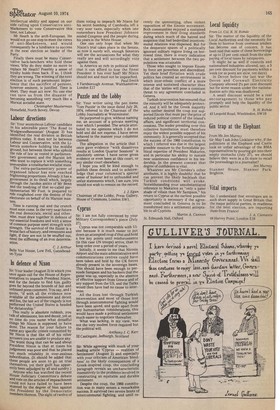Cyprus
Sir: I am not fully convinced by your Military Correspondent's piece (July 27).
Cyprus was not comparable with Ulster because it is much easier to put down an attempted coup dVtat and hold a few key points until reinforcements (in this case UN troops) arrive, than to keep order over a period of years.
Initially, it seems to me that Nicosia Airport and the main administrative and communications centres could have been taken and held by the UK forces already present in the sovereign bases. This should have been enough to persuade Sampson and his backers that the 'game was up, especially in the absence of effective support from Greece and of any support from the US, and the Turks would then have had no cause to intervene.
All the lives lost through Turkish intervention and most of those lost through intercommunal fighting would have been saved, and quite apart from any humanitarian considerations, this would have made a political settlement much easier to negotiate thereafter.
What was lacking, in my view, was not the very modest force required but the political will.
Anthony J. C. Kerr 52 Castlegate, Jedburgh, Scotland Sir: While agreeing with much of your leading article 'Cyprus — realities of Settlement' (August 3) and especially with your criticism of American 'blindness' to the likely consequences of a Greek-inspired coup, the concluding paragraph reveals an uncharacteristic insensitivity to the problems involved in constructing an equitable and durable settlement.
Despite the coup, the 1960 constitution was in many senses a remarkable success. It survived two severe bouts of intercommunal fighting, and until re
cently the unremitting, often violent opposition of the Enosis movement. Both communities enjoyed a sustained improvement in their living standards during which much of the hatred and suspicion that had bedevilled intercommunal relations was dispersed. But for the desperate spasm of a politically ignorant military regime living on borrowed time, there is every indication that a settlement between the two populations was attainable.
Those who sought to impose Enosis by force are powerless and discredited. Yet their brief flirtation with crude politics has created an environment in which inter-ethnic conflict of a more intense and sustained character than that of the 'sixties will pose a constant threat to any agreement concluded in Geneva.
Turkish intervention has ensured that the minority will be adequately protected. And it will be the Greek majority who neither desired the coup nor supported Enosis that must pay the price of reduced political control of the island's affairs, and significant territorial concessions. The leader presiding over this collective humiliation must therefore enjoy the widest possible support of his community. It is generally accepted that the success of the 1960 constitution to which I referred was due in the largest possible measure to the formidable political expertise of President Makarios, and in particular his ability to sustain near unanimous confidence in his leadership. In the present context that degree of confidence is vital.
Whatever are Mr Clerides's other attributes, it is highly doubtful that he can prevent the likely backlash that Turkish conditions will evoke. Notwithstanding your unsubstantiated reference to Makarios as "only a paler shade of villain than Mr Sampson," his return to Cyprus at the earliest possible opportunity is necessary if the agreement concluded in Geneva is to be transformed into a settlement acceptable to all Cypriots.
Martin A. Cannon St. Edmunds Hall, Oxford
































 Previous page
Previous page